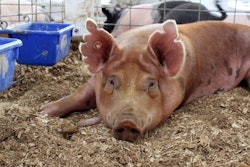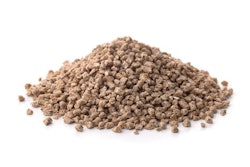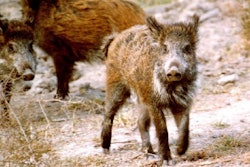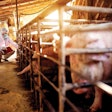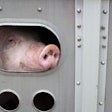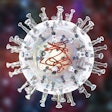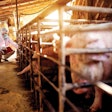
US, Canadian researchers, funded by USDA grant, move forward on virus studies
Ames, Iowa-based Swine Health Information Center (SHIC) has moved forward with research projects to study African swine fever (ASF) in Vietnam, using funds from a U.S. Department of Agriculture (USDA) grant.
One of the projects aims to determine the time and temperature for complete inactivation of the ASF virus, with a goal of gathering as much information on ASF management and control as possible to benefit pork producers in the U.S. and Vietnam, SHIC said on its website.
Researchers from the University of Nebraska and Vietnam National University of Agriculture are specifically looking at aluminum surfaces contaminated with organic materials. The research will simulate the sanitation protocols used to disinfect animal trailers under three conditions:
- Scrape off organic material and bake at three temperatures for 15 minutes
- Scrape off organic material, wash the surface with water followed by baking at three temperatures for 15 minutes
- Scrape off organic material, wash the surface with water, spray disinfectant, followed by baking at three temperatures for 15 minutes
Researchers will use two methods for evaluating the efficiency of heat treatment – real-time PCR and virus titration in cultured cells to measure viral infectivity. Knowing ASF virus inactivation efficacy will better prepare producers for implementing sound biosecurity protocols if the disease were to enter the U.S.
Evaluation of oral fluids
Another SHIC project to be conducted in Vietnam is for field evaluation of oral fluids as a convenient, aggregate sample for early detection and surveillance of ASF.
The study will be conducted on two farms affected by ASF in Vietnam. Protocols for farm selection and sample collection include repetition, observation and concurrent whole blood testing for validation. No less than 500 animals will be used for this study. Oral fluids, whole blood, pharyngeal swab samples and rectal temperatures will all be collected and recorded. Whole blood will be tested by real-time PCR assay and used for comparison of real-time PCR results from oral fluids. A total of 11,420 samples will be tested during the study.
“This method represents a pen-based, non-invasive alternative for testing requiring significantly lower financial and human resources than other methods,” SHIC said on its website. “In the event ASF enters the North American swine population, zoning or compartmentalization combined with active surveillance is critical to facilitate progressive elimination and eradication efforts, while maintaining pork exports from unaffected areas. Active surveillance based on individual sampling is labor intensive and costly, making it impractical during a large disease outbreak. The pen-based aggregate oral (rope) fluid testing being evaluated in this trial represents a potentially valuable alternative to reduce labor and expense for producers.”
Collaborators on this project are from the Canadian Food Inspection Agency – National Centre for Foreign Animal Diseases, Vietnam National University of Agriculture, Iowa State University, National Bio and Agro-Defense Facility, USDA Animal Research Center and Plum Island Animal Disease Center.
Two-part program funded by USDA grant
These projects are part of a two-part “capacity-building program” announced in November 2019 and funded by a US$1.7 million grant from the USDA’s Foreign Ag Service division. According to Paul Sundberg, executive director of the SHIC, Vietnam was chosen as a research venue because it is willing to cooperate, they’re rather open, and they’re rather excited about cooperating.”
View our continuing coverage of the African swine fever outbreak.


